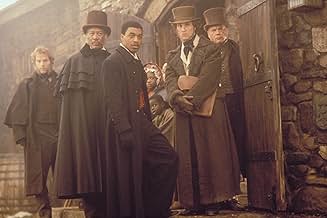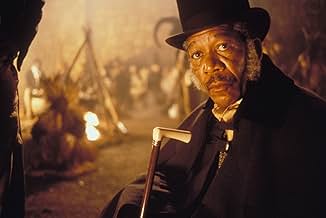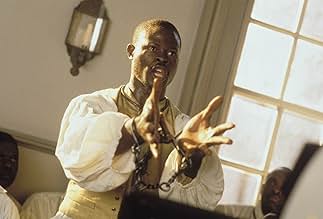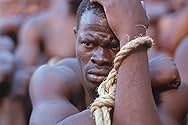Nel 1839, la rivolta dei prigionieri Mende a bordo di una nave spagnola causa una grande controversia negli Stati Uniti quando viene catturata al largo della costa di Long Island. I tribunal... Leggi tuttoNel 1839, la rivolta dei prigionieri Mende a bordo di una nave spagnola causa una grande controversia negli Stati Uniti quando viene catturata al largo della costa di Long Island. I tribunali devono decidere se i sono schiavi o liberi.Nel 1839, la rivolta dei prigionieri Mende a bordo di una nave spagnola causa una grande controversia negli Stati Uniti quando viene catturata al largo della costa di Long Island. I tribunali devono decidere se i sono schiavi o liberi.
- Regia
- Sceneggiatura
- Star
- Candidato a 4 Oscar
- 11 vittorie e 44 candidature totali
- Lieutenant Meade
- (as Darren Burrows)
Recensioni in evidenza
That is, in essence, what Steven Spielberg's gripping drama "Amistad" is about. Through its various dramas, Spielberg presents a case about a group of Africans, who, after being seized from their home, were forced onto a ship and sent to the United States aboard "La Amistad". On their way there, the slaves, led by Cinque (Djimon Hounsou), rebelled, killing off part of the crew. However, the ship was still directed towards the United States, where the Africans were brought to trial under murder.
In the court, various factions claim ownership of the slaves, and therefore try to seize them away. The United States government, led by President Martin Van Buren (Nigel Hawthorne), and Secretary of State Secretary Forsyth (David Paymer), try to ship the Africans to Spain, where an 11 year old Isabella II (Anna Paquin) wants them back. The two Spaniards who own "La Amistad" want the slaves for themselves. The American ship that found the slaves also wants them. In the midst of this are two abolitionists (Stellan Skaarsgard and Morgan Freeman), who want the slaves to be free. They enlist the help of lawyer Matthew McConaughey, who tries to free them. Through various legal proceedings, the case appears before the Supreme Court, where it is argued by ex-President John Quincy Adams (Anthony Hopkins).
The film itself is a visual wonder. Spielberg favorite Janusz Kaminski sets the film in a dark, somber mood when appropriate, and a visual setting when appropriate as well. At times, the film is very slow, and very methodical. Spielberg is not at his finest here, the courtroom scenes have a tendency to lag. But Spielberg's finest work in the film, the opening scene, a scene of Cinque's family, and the brutal voyage of the slaves to America, is altogether stunning. It is this emotional force that carries the film. McConaughey is superb as the lawyer defending the Africans, Hopkins is sensational as the old Adams, Freeman is outstanding when used (Spielberg vastly under uses his supreme talents), and the rest of the cast is stellar. The movie, however, belongs to Hounsou. His emotional intensity is brilliant. Spielberg manages to make even the slowest scenes sparkle with focus on Hounsou, and the film's extraordinary power is simply captivating. The film is flawed, for most of the supporting characters are merely cardboard. But that doesn't matter. The story is a gripping one, and one of extreme importance. Kudos to Spielberg for finding it, finding the right men for the job, and letting the audience listen to the words of Cinque. A good job all around. ***1/2 out of 4, or an 8 out of 10.
Amistad ranks as one of McConaughey's finest performances, perhaps his best. But nearly the entire cast is blown off the screen by the passionate, sensitive and profound performance of Djimon Hounsou. Hopkins is good as Adams, but what else is new? Though the film does not have a literary feel - it is pure cinema - it is a truly great story featuring bold characters and a deep and simple emotionality which draws its audience in. Alistad has a spirit that can only be described as truthfulness.
Despite his detractors, Spielburg proves again and again that morally decent films with positive messages can be entertaining and artfully crafted.
Highly recommended.
"Amistad" tells the story of a group of Africans who start a revolt against the crew of the slave ship La Amistad and get adrift for several weeks after this horrible event. Then they are discovered by some American marine officers, who bring the ship into harbor and hand over the slaves to the local authorities. Soon they have to stand trial for this revolt and the fact that they have murdered the crew. But a couple of honorable men, who want to end the slavery in the New World, will defend them with everything that is within their power ... even if that means that they will offend some other countries or start a civil war.
At the same time it's very easy and very hard to say what I liked about this movie. I liked almost everything about it, but explaining why will take some time. Let me start with the story on itself. The fact that it hasn't been told at least a dozen times makes it original, but doesn't make it easy to compare it to other similar movies of course. Still, the quality was more than OK and had a lot of variation to offer. It's clearly well-written with a good eye for detail and even though I'm normally not a fan of court room drama's, I must say that it didn't even bother me that a court room was the place where the biggest part of this movie was set. What I also liked was the acting. From people like Morgan Freeman and Anthony Hopkins you can't expect anything else but a fine performance, but it was the rest of the cast that offered me a nice surprise. Djimon Hounsou for instance still isn't a house hold name, even though he has played in a few excellent movies like "Gladiator" and "In America", but once again he proves that he's a talented actor and I sure hope to see him in many more big productions soon.
Even though a large part of this movie was shot in a court room, it also offered plenty of other sets. You'll get to see the fort in Sierra Leone where the slaves were brought together to be shipped to the New World, you'll see a nice representation of the American cities of those days, you'll see the ships of that time... And perhaps it's the slave boat and all the scenes on it that were the most incredible. I don't think the horror of the slave trade was more obvious as it was in those scenes. They certainly aren't suited for people who can't stand the sight of blood or very graphic violence, but excluding them from this movie would not only be a shame, it would harm the sense of reality. And it's that sense of reality that makes this movie so special. Of course Steven Spielberg knows exactly how to make a movie feel as real as possible. Think of "Schindler's List" and "Saving Private Ryan", both movies that will always be in my list of the best movies I've ever seen, but with this movie he has proved that he can do more than telling a story situated in WWII.
In the end I can only say that this is a movie that every American and every European should see. The Americans should see it because the slaves ones were the reason why the plantations in the South prospered and the civil war was fought and the Europeans shouldn't miss it, for we should never forget that the slave trade will always be a dark page in our long history. This movie is for so many reasons worth to be seen (not once, but at least a couple of times), that it doesn't deserve anything less than an 8.5/10.
Everyone in the film gives an excellent performance. The real power comes from Djimon Hounsou (Cinque) and Anthony Hopkins (John Quince Adams). Hopkins' summation at the trial defines what America is all about.
Lo sapevi?
- QuizSir Anthony Hopkins astounded the crew by delivering the entire seven-page courtroom speech in a single take. Steven Spielberg was so in awe, he couldn't bring himself to call him Tony, and insisted on addressing him as Sir Anthony throughout the shoot.
- BlooperMartin Van Buren was never photographed while in office, and in 1839 photography was extremely new technology and not widespread. The first president to be photographed while in office was Van Buren's immediate successor William Henry Harrison in March 1841. Van Buren was photographed in 1845, well after he had left office, but he was not wearing a sash as depicted in the movie. Former Presidents John Quincy Adams and Andrew Jackson were also photographed that same year.
- Citazioni
John Quincy Adams: [to the Court] This man is black. We can all see that. But can we also see as easily that which is equally true: that he is the only true hero in this room? Now, if he were white, he wouldn't be standing before this court fighting for his life. If he were white and his enslavers were British, he wouldn't be standing, so heavy the weight of the medals and honors we would bestow upon him. Songs would be written about him. The great authors of our times would fill books about him. His story would be told and retold, in our classrooms. Our children, because we would make sure of it, would know his name as well as they know Patrick Henry's. Yet, if the South is right, what are we to do with that embarrassing, annoying document, The Declaration of Independence? What of its conceits? "All men created equal," "inalienable rights," "life, liberty," and so on and so forth? What on Earth are we to do with this? I have a modest suggestion.
[tears papers in half]
- Curiosità sui creditiThe events depicted did not historically occur at Fort El Morro
- Versioni alternativeThe board of film censors of Jamaica have excised the opening scenes, depicting a violent slave uprising on a ship, from all copies of the film released in Jamaican theatres.
- Colonne sonoreAndante From Quartet No. 2 In B Flat Major
Written by Giovanni Battista Viotti
Performed by Quartetto Aira
Courtesy of Dynamic SRL.
I più visti
- How long is Amistad?Powered by Alexa
Dettagli
Botteghino
- Budget
- 36.000.000 USD (previsto)
- Lordo Stati Uniti e Canada
- 44.229.441 USD
- Fine settimana di apertura Stati Uniti e Canada
- 4.573.523 USD
- 14 dic 1997
- Lordo in tutto il mondo
- 44.229.441 USD
- Tempo di esecuzione2 ore 35 minuti
- Colore
- Mix di suoni
- Proporzioni
- 1.85 : 1
Contribuisci a questa pagina






































